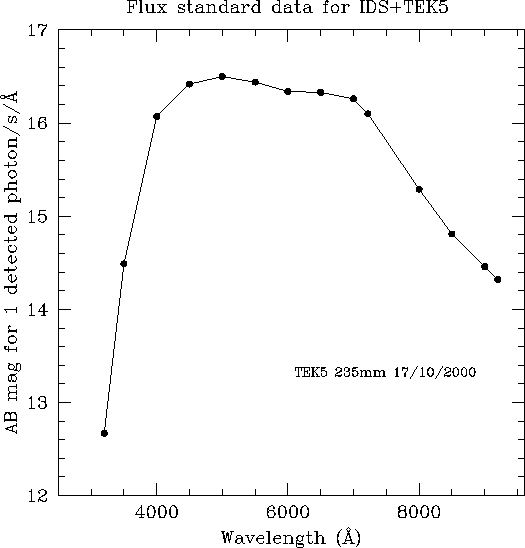
Home ·
Search ·
About ING ·
Astronomy ·
Public Information ·
Engineering
The Tek5 CCD for use on IDS
- General information on the device
- Spectral resolutions and wavelength coverage
- Spatial scale on IDS
- Fringing and Cosmetic defects
- Flux standard data and empirical through-puts
- Quality control history of Tek5
Back to IDS Homepage
Spectral resolutions and wavelength
coverage
The table linked here
gives the dispersion provided by each grating when mounted on the 235mm
and the 500mm cameras. Observers can calculate the dispersion provided,
given that the pixel size is 24 microns. Since the two cameras have different
magnifications, and hence different slit-width specfications for a particaular
required resolution, and since we also have the
EEV10 available for the IDS (with 13.5 micron pixels) , Observers should
think carefully about what is the best option for their programs.
Spatial scale on IDS
A spatial scale of 0.7 arcsec/pixel and 0.33 arcsec/pixel
is archieved on the 235mm and the 500mm cameras respectively.
Fringing and Cosmetic defects
The TEK chips suffer from fringing in the red part
of the spectrum, but the effect is considerably less severe than the EEV42-80s.
Here you have an illustrative
flat field spectra for a similar Tek chip, but in the meantime
the following numbers should serve as a reference guide to the severity
of the problem :
Wavelength Peak-to-Peak Amplitude
6500Å 0%
7000Å 0%
7500Å 2%
8000Å 5%
8500Å 10%
9000Å 15%
There are a few cosmetic defects on the surface of
the chip, but nothing particularly severe. A flat
field image plus bias image will be visible from here shortly.
Flux standard data and empirical through-puts

Quality control history of TEK5
Coming soon .....!
This page is undergoing continual change and enhancements, if there
is anything you wish to see changed or added then please mail me.



